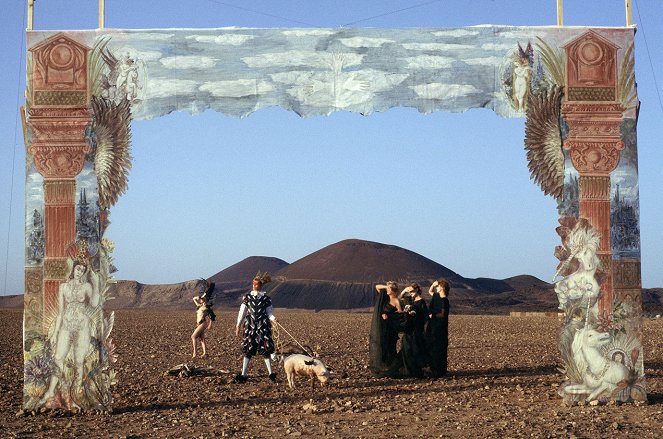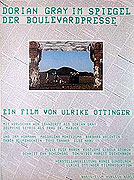Regie:
Ulrike OttingerMusik:
Peer RabenBesetzung:
Veruschka von Lehndorff, Delphine Seyrig, Tabea Blumenschein, Irm Hermann, Magdalena Montezuma, Barbara Valentin, Toyo TanakaInhalte(1)
Frau Dr. Mabuse, head of an international media empire, fabricates her own reality through distortion of images, meanings and words. She is more than eager to extend her power. Bored aristocrat Dorian Gray is the perfect object and victim of her unscrupulous plan for further expansion. To make his life interesting to the general audience, as she understands it, she takes the matter in her own hands and for starters introduces him to an opera singer Andamana. (Moscow International Film Festival)
(mehr)Kritiken (1)
Between Freak Orlando and Dorian Gray in the Mirror of the Popular Press, there is a shift (note - the term “shift” does not have to be taken normatively) towards a more classical narrative, and indeed we encounter a dramatic arc here. In the context of the author's previous films, it is almost a perfectly solid arch! I believe that the film has a more or less clear purpose and is therefore about something, i.e., it is an update of a classic literary work. However, unlike the original, Dorian does not see himself in painting, but rather in the tabloid press. But while in the original the painting becomes more hideous as Dorian changes, here Dorian transforms depending on how his media image changes. Herein lies the main theme of the film, based on contemporary social science studies (including gender studies, post-structuralism, media studies, cultural studies, etc.) - the theme of individual identity construction through media discourses, the secondary nature of the individual in relation to mass societal and cultural practices, etc. However, the film is not primarily an objectifying pseudo-documentary, as that would not be Ottinger - her penchant for costumes, dada or twistedly garish aesthetics (the 1980s!) is also present here. So is surrealism, but it is less prominent and the viewer can more easily relate the surreal scenes to the overall structure. Compared to Freak Orlando, the individual surreal scenes do not have complete autonomy - whether it is the opera scene or others – and they are always more or less connected to the film's underlying theme, which is the step forward that the character of the all-powerful media magnate D. Seyrig takes in relation to the poor Dorian (the opera as a distorted mirror of the actress and Dorian's publicized relationship; Seyrig, who also appears in seemingly purely personal delirious visions of the main character, who no longer has a private life, etc.).
()
Galerie (1)
Photo © Moscow International Film Festival 2016

